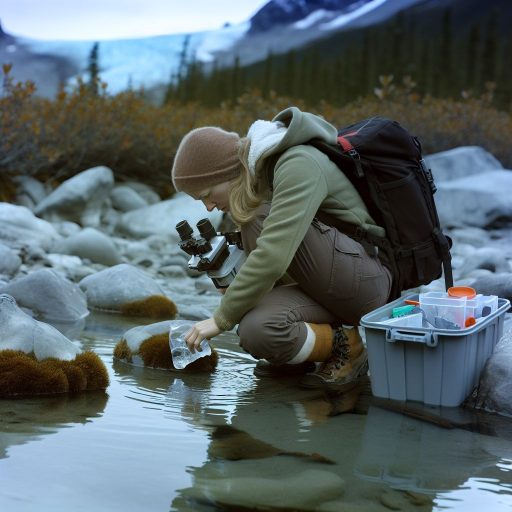Introduction to the Role of Ecologists in Conservation
Ecologists play a crucial role in conservation efforts worldwide.
They study the interactions between organisms and their environments.
This knowledge helps identify threats to biodiversity.
Furthermore, ecologists work to develop solutions to these challenges.
Understanding Ecosystems
Ecologists analyze different ecosystems to understand their dynamics.
They observe how species interact within these environments.
This research helps in recognizing the importance of each species.
Additionally, it highlights the need for preservation efforts.
Guiding Conservation Strategies
Using their findings, ecologists inform conservation strategies.
They contribute to the creation of protected areas to preserve habitats.
Moreover, ecologists advocate for sustainable practices in resource management.
This guidance is essential to maintain ecological balance.
Collaborating with Communities
Ecologists often work alongside local communities.
They educate people about the importance of biodiversity.
Involving communities ensures that conservation efforts are effective.
Additionally, local knowledge can significantly enhance ecological understanding.
Research and Monitoring
Ongoing research and monitoring are key in conservation.
Ecologists track changes in species populations over time.
They assess the effectiveness of conservation measures.
This data informs future strategies and initiatives.
Historical Context of Ecology and Its Evolution into a Conservation Science
Origins of Ecology
Ecology emerged in the mid-19th century as a branch of biological sciences.
Its foundation rested on understanding the relationships between organisms and their environments.
Scientists like Ernst Haeckel helped popularize the term ‘ecology’ in 1866.
During this period, many focused on describing ecosystems and biodiversity.
Development of Ecological Concepts
The early 20th century saw significant advancements in ecological theory.
Unlock Your Career Potential
Visualize a clear path to success with our tailored Career Consulting service. Personalized insights in just 1-3 days.
Get StartedResearchers began to study ecological succession and energy flow in ecosystems.
Notably, the work of Charles Elton in the 1920s emphasized food webs.
Such studies laid the groundwork for modern ecology.
Integration with Conservation
The mid-20th century heralded a shift towards conservation ecology.
This transition arose from increasing concerns about biodiversity loss.
Influential figures like Aldo Leopold articulated the need for land ethics.
His book, “A Sand County Almanac,” connected ecological science to conservation principles.
Modern Conservation Efforts
Today, ecologists engage in various conservation strategies worldwide.
These strategies include habitat restoration and endangered species protection.
Organizations like the World Wildlife Fund utilize ecological research to guide policies.
Moreover, ecologists collaborate with governments and communities for sustainable practices.
The Role of Technology in Ecology
Advancements in technology have enriched ecological research.
Remote sensing and GIS have transformed data collection and analysis.
As a result, ecologists can assess ecosystems on a larger scale.
This progress enhances conservation planning and implementation.
Key Methodologies Used by Ecologists in Studying Ecosystems
Field Studies
Field studies allow ecologists to observe ecosystems in their natural settings.
They collect data on species interactions, population dynamics, and habitat conditions.
Additionally, researchers document environmental changes over time.
This approach often yields rich, contextual insights into ecosystem functioning.
Laboratory Experiments
Laboratory experiments provide controlled conditions for ecological research.
Here, ecologists manipulate variables to study specific ecological processes.
This method helps isolate causes and effects in complex systems.
Moreover, laboratory findings often inform larger field studies.
Modeling Techniques
Modeling techniques utilize mathematical frameworks to simulate ecosystems.
Ecologists develop models to predict ecological outcomes under varying scenarios.
This approach enhances understanding of potential impacts from environmental changes.
Additionally, models can guide conservation efforts and habitat management.
Remote Sensing Technologies
Remote sensing technologies enable large-scale ecosystem monitoring.
Ecologists use satellites and drones to gather data on land use and vegetation cover.
This technology provides invaluable information about habitat fragmentation and degradation.
Consequently, it aids in assessing biodiversity and conservation needs.
Citizen Science
Citizen science engages the public in ecological research initiatives.
Volunteers collect data on species sightings and environmental conditions.
This collaborative approach expands research capacity and data collection.
Furthermore, it raises public awareness about ecological issues.
Gain More Insights: Exploring Wildlife Biologist Salaries in Canada
Case Studies of Ecologists’ Impact on Conservation
Restoration of the Florida Panther
The Florida panther faced severe population declines in the 1990s.
Through research, ecologists identified habitat loss as a primary threat.
They advocated for expanded protected areas in their natural range.
As a result, public agencies implemented successful conservation strategies.
Today, the panther population has increased, demonstrating ecological recovery.
Conservation of the California Condor
The California condor nearly went extinct in the 1980s.
Ecologists played a crucial role in captive breeding programs.
Their efforts focused on ensuring genetic diversity during breeding.
Moreover, they released condors into the wild with monitoring systems.
Now, the population has rebounded to over 500 individuals.
Protection of Coral Reefs
Coral reefs worldwide face threats from climate change and pollution.
Ecologists study coral resilience to identify protection strategies.
For instance, they promote reef restorations using resilient coral species.
Additionally, they implement policies to reduce local stressors on reefs.
The results show improved coral health and biodiversity in many areas.
Mitigation of Invasive Species
Invasive species threaten native ecosystems globally.
Ecologists research the impacts of these species on local biodiversity.
They develop and advocate for management strategies against invasives.
One successful case involved the removal of invasive plants in Hawaii.
This restoration allowed native species to thrive once more.
Community Engagement in Conservation
Ecologists understand community involvement is vital for conservation.
Educational programs help engage locals in protecting species.
For example, beach clean-up initiatives promote awareness about turtles.
Involving communities fosters a sense of ownership over local resources.
Consequently, these efforts lead to increased success in conservation programs.
You Might Also Like: Popular Geology Specializations and Career Paths
Ecologists’ Role in Policy-Making and Environmental Legislation
Influencing Environmental Policies
Ecologists significantly shape environmental policies through scientific research.
They provide critical data to inform lawmakers about ecosystem health.
Moreover, ecologists advocate for evidence-based practices in policy formulation.
This advocacy helps prioritize conservation efforts in legislative agendas.
Collaboration with Government Agencies
Ecologists often collaborate with government agencies on conservation projects.
These partnerships facilitate the implementation of sustainable practices.
For instance, agencies like the Environmental Protection Agency rely on ecologists’ expertise.
This collaboration ensures that legislation reflects current ecological knowledge.
Public Engagement and Education
Ecologists play an essential role in public engagement regarding environmental issues.
They conduct outreach programs to educate the community about biodiversity.
These efforts increase public support for conservation initiatives.
Additionally, informed communities can advocate for better policies themselves.
Providing Solutions to Environmental Challenges
Ecologists identify solutions to pressing environmental challenges.
They assess the impacts of climate change on various ecosystems.
Using this information, they propose strategies to mitigate negative effects.
Thus, their work directly influences legislative responses to environmental crises.
Case Studies and Success Stories
Numerous case studies demonstrate the impact of ecologists on policy-making.
For example, initiatives in habitat restoration have shown significant success.
These projects often stem from ecologists’ research and recommendations.
Such success stories provide models for future conservation efforts.
Challenges Faced by Ecologists in Policy-Making
Despite their contributions, ecologists encounter challenges in policy-making.
Political agendas may conflict with scientific recommendations.
Furthermore, funding constraints can limit their research capabilities.
These challenges highlight the need for continued advocacy and support.
See Related Content: Networking Tips for New Ecologists in Canada

Importance of Biodiversity and the Threats Posed to It
Understanding Biodiversity
Biodiversity refers to the variety of life on Earth.
It encompasses different species, ecosystems, and genetic variations.
This diversity is vital for the health of our planet.
Moreover, biodiversity supports ecosystem services crucial for human survival.
The Role of Ecosystems
Ecosystems provide essential services such as pollination and nutrient cycling.
These processes are fundamental to food production and ecological stability.
In addition, healthy ecosystems help regulate climate and air quality.
Threats to Biodiversity
Human activities pose significant threats to biodiversity.
Habitat destruction is a leading cause of species decline.
Pollution further degrades natural habitats, impacting wildlife health.
Climate change alters habitats, pushing species to adapt or face extinction.
Consequences of Biodiversity Loss
The loss of biodiversity disrupts ecosystem balance.
It reduces resilience, making ecosystems vulnerable to change.
Additionally, it threatens food security and access to clean water.
Consequently, human well-being also suffers from decreased biodiversity.
The Urgency of Conservation
Immediate action is necessary to combat biodiversity loss.
Conservation efforts can help restore and protect ecosystems.
These actions can also promote sustainable use of natural resources.
Ultimately, preserving biodiversity is essential for our future.
Discover More: The Connection Between Oceanography and Global Science
Collaborative Efforts Between Ecologists and Local Communities in Conservation
Building Trust and Understanding
Successful conservation initiatives start with building trust between ecologists and local communities.
Ecologists engage with residents to share their vision and objectives.
Regular dialogue fosters understanding and strengthens relationships over time.
Consequently, communities become more open to conservation efforts.
Involving Communities in Decision-Making
Culminating efforts involve local communities in decision-making processes.
This approach empowers residents and makes them stakeholders in conservation.
As a result, they feel more connected to the projects.
Furthermore, their local knowledge enhances the effectiveness of conservation strategies.
Education and Training Opportunities
Ecologists provide education on ecological principles and practices to communities.
Workshops and hands-on training sessions equip residents with valuable skills.
Moreover, education fosters a sense of responsibility towards local ecosystems.
This knowledge enables community members to participate actively in conservation initiatives.
Implementing Sustainable Practices Together
Collaboration often leads to the development of sustainable practices.
Both ecologists and communities identify local resources and vulnerabilities.
By working together, they create tailored conservation plans.
Such plans address ecological challenges while respecting local traditions.
Monitoring and Evaluating Conservation Efforts
Monitoring conservation efforts is essential for assessing their effectiveness.
Communities play a crucial role in tracking changes in biodiversity and ecosystems.
Ecologists work alongside residents to analyze data collected over time.
This collaborative approach fosters adaptive management of conservation strategies.
Celebrating Successes and Sharing Knowledge
Celebrating successes boosts morale and encourages ongoing participation.
Communities and ecologists share their achievements through local events.
These events spotlight biodiversity gains and community involvement.
Sharing knowledge also inspires other regions to adopt similar collaborative frameworks.
Future Challenges and Opportunities for Ecologists in Promoting Biodiversity
Emerging Environmental Threats
Ecologists face numerous emerging environmental threats.
Climate change poses significant challenges to ecosystems.
Habitat loss continues to accelerate due to human activity.
Pollution disrupts ecosystems and harms biodiversity.
Invasive species outcompete native species for resources.
Addressing these threats requires innovative strategies.
Advancements in Technology
Technological advancements offer new opportunities for ecologists.
Remote sensing allows for better monitoring of ecosystems.
Genetic tools enhance conservation efforts through species recovery.
Data analytics improve the understanding of ecological patterns.
Collaboration with tech companies can amplify these advancements.
Public Engagement and Education
Engaging the public is essential for biodiversity conservation.
Ecologists must develop effective outreach programs.
Educational initiatives can increase awareness of biodiversity issues.
Community involvement enhances conservation efforts.
Social media can be a powerful tool for outreach.
Collaborative Efforts
Collaboration among scientists and organizations is critical.
Partnerships can leverage resources and knowledge.
Cross-disciplinary approaches enhance ecological research.
Sharing data fosters a unified response to conservation challenges.
International cooperation can address global biodiversity concerns.
Policy Advocacy
Ecologists have a vital role in influencing policy.
Advocating for sustainable practices can protect ecosystems.
Policies should integrate scientific research for effective outcomes.
Engaging with policymakers helps translate science into action.
Ecologists should work to ensure biodiversity is prioritized.
Additional Resources
The Society for Conservation Biology
Global Ecology and Conservation | Journal | ScienceDirect.com by …




